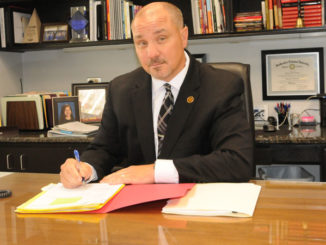
Despite promises from national leaders to ‘do what it takes’ to rebuild New Orleans, the devastated city has been mostly left to fend for itself.
BATON ROUGE — As Carnival season paraded through south Louisiana last month, briefly pushing aside the memories of those fateful days last fall with bags of throws and elaborate parties, a slew of special interest groups were releasing studies and polls and surveys that brought reality ringing back in a most sobering way.
The short-but-potent legacy of Hurricane Katrina hit its six-month mark with the dawn of Ash Wednesday, and pollsters were not about to miss their opportunity to gauge the sentiment of voters and businesses during this capsule of time – neither have managed a rosy outlook yet, if you believe the numbers. Studies have also been released by think-tank groups slamming the rebuilding process as stagnant and ripe with curious contracting.
Meanwhile, Gov. Kathleen Blanco wrote in a column coming off of Mardi Gras that “recovery and reform” are claiming victories in Louisiana. She points to a proposed $4.2 billion in Community Development Block Grant funding for housing as an indication. Blanco also notes the Legislature’s recent efforts to consolidate certain levee boards.
The entire process has been a “roller coaster of emotion,” Blanco added, marked by “dark days of frustration when it was hard to believe that our voices were being heard.”
Based on the numerous polls and surveys released in the last few weeks, voters and businesses are still feeling that despair.
The most recent research by Pensacola-based pollster Verne Kennedy reveals an outraged electorate. When respondents were asked if they were happy with their public officials’ in light of the hurricanes, 41 percent reported they were “not happy,” 29 percent chose “strongly displeased” and 24 percent opted for “angry as hell.”
On the re-elect Blanco question, 71 percent want to “give someone else a chance.” Of the 600 Louisiana voters polled during the second week of February, 53 percent said the state was undoubtedly on the wrong track, as far as leadership and recovery.
Another CBS News poll, in concert with an analysis released last week by the Internet arm of Black Entertainment Television, also found that African-Americans in New Orleans are “overwhelmingly dissatisfied” with the efforts to rebuild. The CBS News Survey Unit conducted the poll of 1,018 adults, including 207 African-Americans.
Among the more eye-opening findings by CBS News is the pessimistic outlook that African-Americans have for City of New Orleans — 38 percent believe the city will never be rebuilt and 33 percent believe white evacuees will be able to return before those of color.
While he questions exactly who was questioned by CBS pollsters and where the respondents are from, Congressman William Jefferson, a New Orleans Democrat, said government will have to offer people hope with a solid plan to get more positive responses.
“People want to come home,” Jefferson said. “There is much greater interest from people who are from New Orleans to return. They want to have a better set of opportunities. They don’t want to come home to just anything. We just have to set the path for them to come home.”
Businesses that have returned to Orleans Parish, or are considering it, have a much more optimistic outlook, according to a survey conducted by the Public Policy Research Lab at Louisiana State University. Of the 937 local businesses interviewed for the telephone survey, 52 percent said they would be “as successful as or more successful than they were before” last year’s two hurricanes.
“While returning business owners considered levee protection to be their chief concern, it is also interesting to note that close to half did not think so,” said Nina Lam, LSU geography professor.
Even though levee consolidation has become a policy juggernaut on the state level, Lam said businesses continue to be more worried about customer base, employees, communication, insurance, governmental problems, damage to premises, utilities and financing.
Richard Campanella, a geographer at Tulane’s Center for Bioenvironmental Research, is working in conjunction with the LSU study and has released a few of his own findings — discovered while researching the three re-emerging arteries of St. Claude Avenue, Magazine Street and Carrollton Avenue on his bicycle.
Campanella said local businesses are coming back sooner and in greater numbers than national chains, and primary goods and services are not necessarily opening before stores that sell luxury items.
Other businesses, however, primarily those from outside the state with political connections, are raking in the cash, according to a report released late last month by the Gulf Coast Commission on Reconstruction Equity, a nonprofit consisting of labor and religious groups.
“Our research has found that the Gulf Coast has been besieged by large corporate profiteers, while many workers don’t even receive their wages,” said Rev. Nelson Johnson, president of the group. “We’re calling on Congress to pass tough new criteria for anyone receiving federal dollars to rebuild the Gulf Coast.”
The study sheds light on the “revolving door” between government officials and regulators and the businesses they regulate. In fact, the association of former government officials with companies seeking federal contracts is commonplace, and has clearly had an impact on the awarding of contracts, the study states.
A few examples include the Fluor Corporation, which has donated more than $600,000 to political candidates since 2000, mainly Republicans; Shaw Group, which has hired Joseph Allbaugh, a former FEMA director, as a consultant; Halliburton, of which Vice President Dick Cheney was CEO until 2000; and Bechtel Group, whose executives and consultants once held top positions in the White House and CIA.
All of these factors combined – voter fatigue, business challenges, the perception of corruption – are only adding to the “fundamental barriers” facing renewal, said Chris Kromm, director of the non-profit Institute for Southern Studies based in Durham, N.C.
“Despite promises from national leaders to ‘do what it takes’ to rebuild New Orleans, the devastated city has been mostly left to fend for itself – with tragic results,” he said.
Kromm recently released a 36-page report, dubbed “The Mardi Gras Index,” that analyzes the city’s post-hurricane status in 11 areas including housing, public health, the economy and disaster preparedness. The report also looks at over 130 indicators, and finds that, despite a few hopeful signs, progress has largely stalled on the key issues that will ultimately shape the new city.
Still, leaders like Blanco remain overly optimistic about the state’s future. She said officials are going to move as quickly as possible to put federal funding to work, but only recently have there been signs of progress. The uphill battle wages on, the governor argues, and the movement must not be distracted by “dark days of frustration” or negative voices.
“We must tackle our rebuilding with the pace of a sprinter and the heart of a distance runner…. But this process is an arduous one. It will require the endurance, patience and heart,” Blanco said.





Be the first to comment